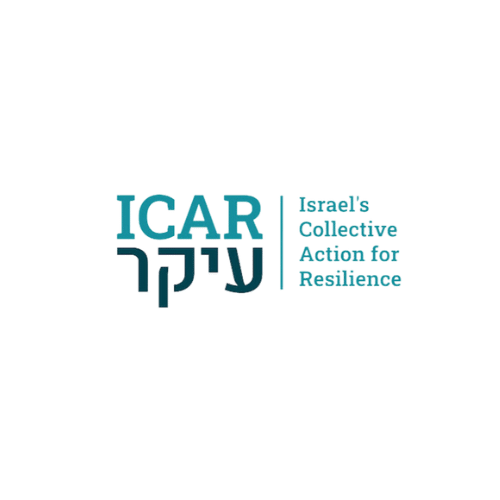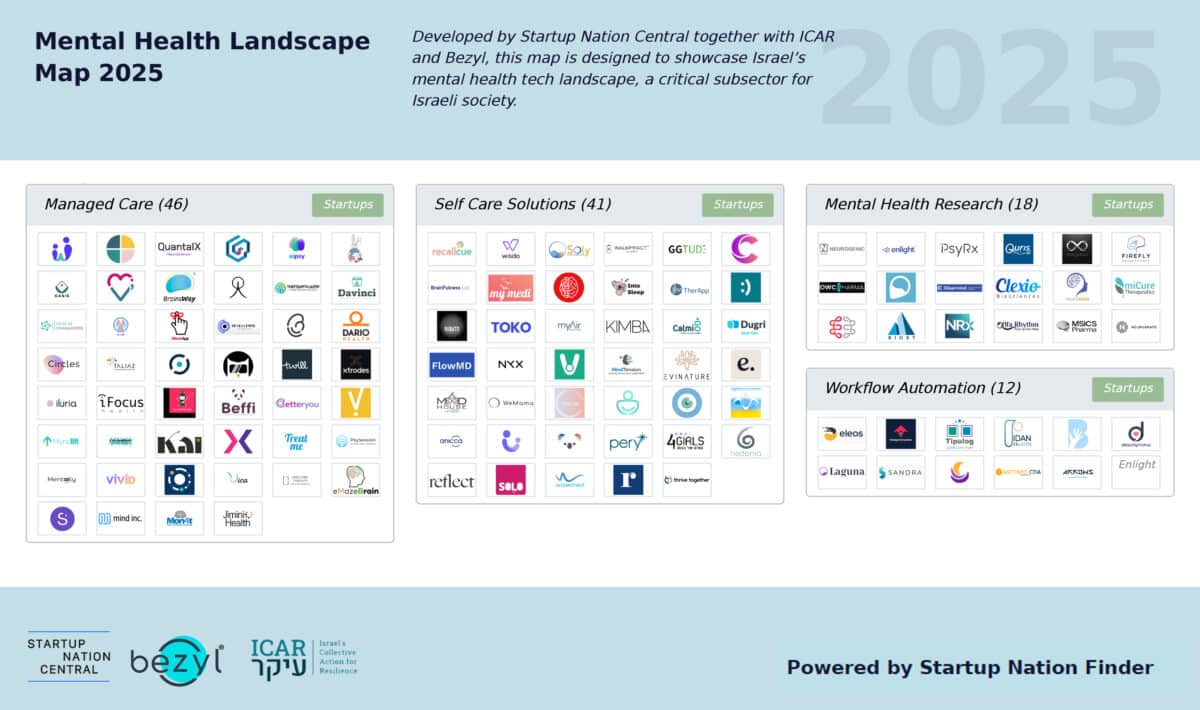2025 Landscape map
Mental Health Innovation
February 25, 2025
Including commentary by:


2025
Agriculture & Food Tech Landscape Map
February 4, 2025
Written by:
Alon Turkaspa, Director Global Partnerships, Startup Nation Central
Dana Kedar, Executive Director, GrowingIL
Overview
Mental health technology encompasses a wide range of solutions, from AI-powered triage and digital therapy to peer support platforms, workflow automation, and biomarker-driven diagnostics. To ensure these innovations are effectively integrated into Israel’s mental health ecosystem, we mapped the sector into four key categories, outlining their role in trauma recovery and resilience-building.
The events of October 7th have sparked a surge in mental health startups, driven by necessity as the country grapples with collective trauma. This wave of innovation reflects both an urgent need for scalable solutions and the long-term implications of mental health challenges on Israeli society.
The Map
Trauma recovery is deeply personal—what works for one individual may not work for another. Some find solace in peer support, while others require structured therapy, medication, or self-guided tools. To navigate this complexity, we segmented Israel’s mental health technology landscape into four core categories, each representing a distinct function within the continuum of care. The four core categories we identified are:
- Self-Care Solutions: Tools that empower individuals to proactively manage their mental well-being without direct professional involvement.
- Managed Care Platforms: Digital and hybrid systems that connect users with mental health professionals, streamlining access to personalized care.
- Workflow Automation: AI-driven technologies designed to reduce administrative burdens, enabling clinicians to focus more on patient care.
- Mental Health Research: Innovations in biomarkers, AI-based diagnostics, and precision psychiatry aimed at revolutionizing mental health treatment.
Each category plays a vital role in delivering timely, tailored support, creating a comprehensive framework to scale trauma recovery solutions and address Israel’s evolving mental health challenges.
“Out of our deepest breaking points comes the opportunity to redefine how we train, diagnose, treat, and rehabilitate our community. Our unique experience with resilience allows us not only to endure but to build upon it—transforming challenges into new pathways for recovery and strength.”
– Dr. Alona Barnea, Head of Neurotechnology Research, Science & Technology Unit, Government
1. Self-Care Solutions
Self-care solutions empower individuals to take control of their mental health, often before they seek professional intervention. These tools include biofeedback devices, peer-support platforms, and AI-powered therapy solutions that provide structured guidance and coping mechanisms. By placing support directly in the hands of users, these technologies offer accessible, stigma-free, and immediate relief.
The following companies are notable examples of innovation in self-care solutions, selected for their role in providing accessible, technology-driven tools that empower individuals to proactively manage their mental health without professional intervention.
- Reflect offers The Orb, a biofeedback device that helps users manage stress and anxiety through real-time physiological feedback, with 71% reporting reduced anxiety and 66% improved sleep.
- Dugri is a digital platform for structured peer support, widely used in Israel to help soldiers and families process trauma through guided, anonymous conversations.
2. Managed Care Platforms
Managed care platforms bridge the gap between individuals and professional mental health support, whether through telehealth, AI-assisted interventions, or hybrid digital-clinical therapy.
The following companies are notable examples of innovation in managed care, selected based on their real-world deployment and impact in improving access to professional mental health support.
- XRHealth provides VR therapy for Israeli reservists and families, offering immersive interventions between sessions, with over 1,000 treatments administered—some even used in combat zones for real-time stress management.
- Kai.ai is an AI-driven mental health platform using CBT and positive psychology to support resilience, partnering with Israeli universities to provide scalable care for thousands of reservists.
- GrayMatters Health uses brain-computer interface technology to help PTSD patients regulate brain activity via amygdala-based biomarkers, with 67% experiencing lasting symptom reduction.
3. Workflow Automation
With demand for mental health care far outpacing supply, automation tools help streamline services, reducing wait times and allowing clinicians to focus on treatment rather than administration. AI-driven automation solutions also ensure that individuals in crisis receive timely interventions, making the system more efficient and effective.
The following companies are notable examples of innovation in workflow automation, selected for their ability to enhance clinical decision-making and reduce administrative burdens.
- Taliaz has developed an AI-driven triage system that reduced trauma center waiting lists by 85% in Israel by analyzing patient profiles to efficiently prioritize urgent care and direct less severe cases to digital interventions.
- Eleos Health leverages AI to automatically capture key therapy moments and generate clinical documentation, streamlining workflows so therapists can focus on patient care and achieve faster symptom reduction.
4. Mental Health Research
The most cutting-edge mental health innovations focus on early detection, precision psychiatry, and biomarker-driven diagnostics. By leveraging AI and machine learning, researchers and startups are working to improve the accuracy of mental health diagnoses, predict treatment effectiveness, and create personalized therapeutic interventions.
The following companies are notable examples of innovation in mental health research, selected for their groundbreaking work in precision psychiatry and AI-driven drug development.
- NeuroKaire pioneers personalized mental health treatments by using patients’ blood cells to create brain models for testing medications on lab-grown neurons, reducing the trial-and-error process in treating PTSD, depression, and anxiety.
- Quris-AI is an artificial intelligence innovator focused on disrupting the drug development process. The company’s Bio-AI Clinical Prediction Platform is designed to accurately predict which drug candidates will safely work in humans, thereby avoiding the tremendous costs of failed clinical trials.
“The integration of technology into mental health care is not just about efficiency; it’s also about ensuring that evidence-based treatments are delivered according to individual needs and that they can be monitored and improved based on real-time data.”
– Prof. Jonathan Huppert, Founder of the Center for Trauma Recovery and Director of the Laboratory for the Treatment and Study of Mental Health and Well Being at the Hebrew University of Jerusalem
Mental Health Tech Market data and Trends
Mental health tech is growing steadily
As of today (early 2025) there are 117 active tech companies in Israel addressing mental health. The number of active companies has shown a steady upward trend since 2014. Between 2014 and 2017 growth was relatively slow, reaching only 27 companies in 2017. However, starting in 2018, the growth rate accelerated, and continued through 2024, reaching 116 companies. The overall trend demonstrates a strong expansion in the Mental Health domain over the decade, with increasing momentum in recent years.
Mental health tech is still at its early stages
Mental Health Tech is a rapidly emerging field with many new entrants. As such most companies in this domain have a small workforce, while only a few have many employees. 65% of the companies are very small with up to 10 employees. Another 25% are fairly small with 11-50 employees. Only 10% of companies have scaled and have over 50 employees.
When exploring the funding stage, the immaturity of the Mental Health domain is even more evident. It stands out with a very high share (85%) of early-stage companies, compared to all companies in the Health Tech sector (65%) as well as the entire Israeli tech ecosystem (60%).
Private funding in mental health is showing resilience
Contrary to the overall private funding in the ecosystem, which peaked in 2021 and then dropped in 2022, health tech funding remained elevated in 2022. Within health tech, private funding in mental health continued to rise in 2022, reaching $160M that year. In 2023 private funding dropped in all sectors and demonstrated recovery in 2024.
While the recovery in the health tech sector was very mild, the recovery in mental health was substantial and increased by 66% to $123M in private funding, demonstrating resilience and renewed investor interest.
Managed Care is the most dominant category
The Managed Care category is leading in both the number of companies and the total funding with 39% of the companies and 37% of the total private funding in Mental Health. The Self Care Solutions category is the second most dominant with 35% of the companies.
While there are only 12 companies working on Workflow Automation solutions, which account for only 10% of the companies, they have raised $150M which is 23% of the total private funding.
(*) Private Funding – Total across the entire lifecycle of companies
Notable companies
Eleos Health, one of the most advanced stage startups in the Mental Health space, has raised $128M in total, including $60M in the latest C round in January 2025.
Other startups worth mentioning are Empathy in the Self Care Solutions category who raised $90M, and Valera Health in the Managed Care category who raised $80M.
“When demand for mental health services far exceeds supply, technology is the only practical way to address this mismatch in a cost-effective, scalable manner across the diagnostic, treatment and administrative aspects of the workflow and patient journey.”
– Roy Wiesner, Partner, aMoon Fund
Summary
The rapid growth of Israel’s mental health technology sector reflects both an urgent response to recent national traumatic events as well as a broader shift toward scalable, tech-driven solutions.
By categorizing the industry into Self-Care Solutions, Managed Care Platforms, Workflow Automation, and Mental Health Research, the Mental Health Tech map developed by Startup Nation Central highlights how digital innovations are transforming access to care, streamlining clinical workflows, and advancing precision psychiatry. Despite being in its early stages, the sector is expanding steadily, demonstrating resilience in funding trends and signaling investors growing confidence in the sector’s long-term potential.
To fully realize this potential, Israel must prioritize integrating mental health technology into national healthcare policy, expanding trauma education, and leveraging AI to detect and address mental health trends proactively. Increased funding and international collaboration will be crucial to scaling solutions that can support not only Israeli society but also global communities facing trauma and crisis. By fostering innovation and collaboration, Israel can lead the way in reshaping mental health care for the future.

Methodology Notes
The companies featured on this map were selected based on key indicators of innovation and impact, including recent funding rounds or government grants, notable milestones, strategic partnerships, and the uniqueness of their technology.
To highlight the most relevant innovations, we identified 2-3 notable companies per category based on their active deployment in Israel today—whether supporting soldiers on the front lines, reservists at home, or clinicians managing the surge in mental health cases since October 7th. Many of these startups are not only delivering critical solutions in real time but also played an integral role in shaping the conversation at the ICAR Collective Summit as panelists and thought leaders.

About Us
Startup Nation Central is a free-acting NGO providing global solution seekers frictionless access to Israel’s bold and impatient innovators to help tackle the world’s most pressing challenges. Our free business engagement platform, Finder, delivers unrestricted access to real-time, updated information and deep business insights into the Israeli tech ecosystem.
This map and report were developed by Yael Pomerantz, Health Tech Sector Lead at Startup Nation Central, Esther Howard, Founder and CEO of Bezyl, and Gila Tolub, Co-Founder and Executive Director of ICAR Collective.
Data analysis and map development by Einat Ben Ari, Senior Director of Data and Insights at Startup Nation Central, and Matan Eblagon, Data Sector Specialist at Startup Nation Central.
Edited and contributed to by Chanel Itzhaki Ganor, Marketing Manager at Startup Nation Central.
